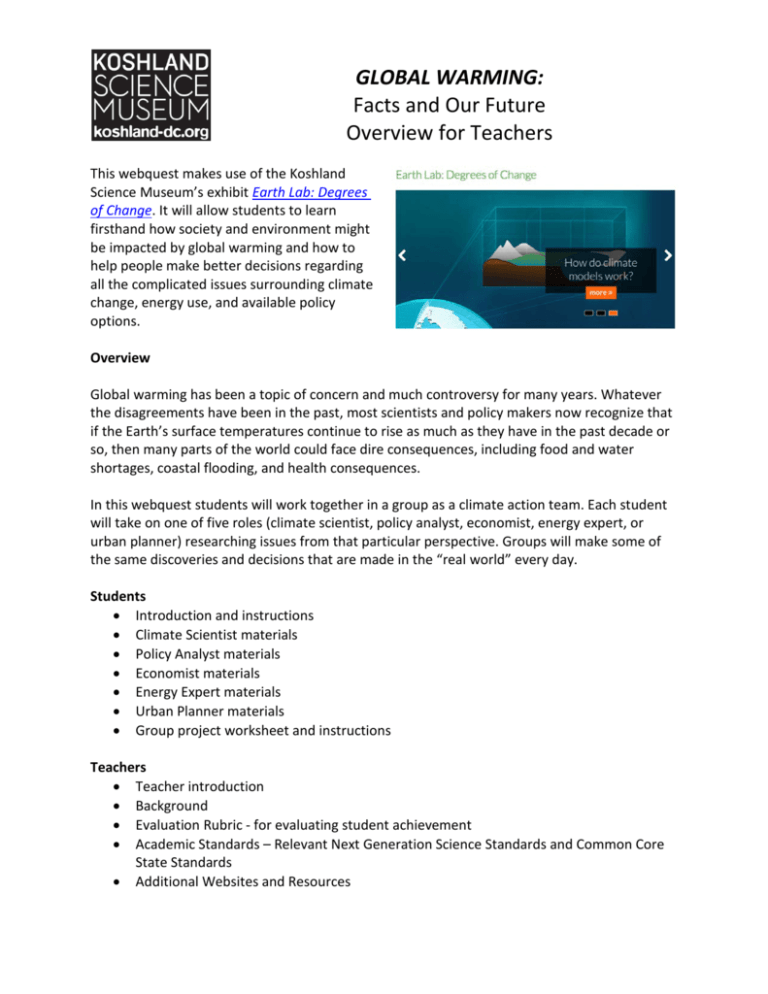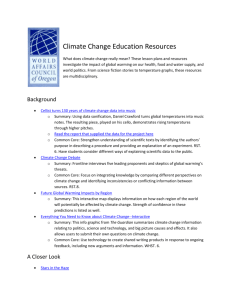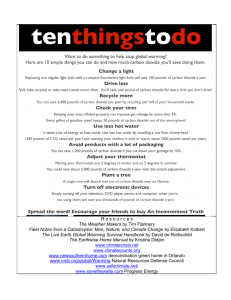Global Warming Webquest: Facts, Future & Teacher Overview
advertisement

GLOBAL WARMING: Facts and Our Future Overview for Teachers This webquest makes use of the Koshland Science Museum’s exhibit Earth Lab: Degrees of Change. It will allow students to learn firsthand how society and environment might be impacted by global warming and how to help people make better decisions regarding all the complicated issues surrounding climate change, energy use, and available policy options. Overview Global warming has been a topic of concern and much controversy for many years. Whatever the disagreements have been in the past, most scientists and policy makers now recognize that if the Earth’s surface temperatures continue to rise as much as they have in the past decade or so, then many parts of the world could face dire consequences, including food and water shortages, coastal flooding, and health consequences. In this webquest students will work together in a group as a climate action team. Each student will take on one of five roles (climate scientist, policy analyst, economist, energy expert, or urban planner) researching issues from that particular perspective. Groups will make some of the same discoveries and decisions that are made in the “real world” every day. Students • Introduction and instructions • Climate Scientist materials • Policy Analyst materials • Economist materials • Energy Expert materials • Urban Planner materials • Group project worksheet and instructions Teachers • Teacher introduction • Background • Evaluation Rubric - for evaluating student achievement • Academic Standards – Relevant Next Generation Science Standards and Common Core State Standards • Additional Websites and Resources Introduction and Instructions for Use in a Classroom Global warming has become one of the most pressing issues facing the United States and the world. This webquest makes use of the Koshland Science Museum’s exhibit Earth Lab: Degrees of Change and is designed to introduce high school and middle school students to the complicated issues surrounding global warming and climate change. Through participating in a fictitious scenario, students will take an active role in determining how and why the climate is changing and how humans may have contributed to these changes. Students become climate scientists, policy analysts, economists, energy experts, and urban planners as they learn about climate science, environmental impacts, policy initiatives, and renewable energy choices. Upon completion of their individual tasks, student teams present their findings and make recommendations that address the situation. This webquest activity can be used in many different ways. To encourage cooperative learning, students should be divided up into groups of five and each student in the group should assume the role of one of the climate action team members. Working in a group allows students to experience the way a real-world investigative team operates. Alternatively, students can complete the webquest individually and investigate all five roles by themselves. Either way, students should be required to share their findings with the class by creating a presentation using multimedia whenever possible. This webquest is designed to take approximately one week. To shorten the activity, students could complete only the group work section, which should take one class period. Evaluation Rubric Initial Group Worksheet Individual Worksheet Group Report and/or Presentation Beginning Developing Accomplished Exemplary Short answers are incomplete or incorrect. Short answers are mostly complete and mostly correct. Short answers are correct and mostly complete. Short answers are thorough and thoughtful. 1 Point 2 Points 4 Points 5 Points Worksheet is incomplete. Answers show minimal understanding of material. Worksheet is complete. Answers show moderate understanding of material. Worksheet is complete. Answers show mastery of material. Worksheet is complete. Answers show the highest level of understanding. 5 Points 5 Points Grammar, organization, formatting, logical arguments, and adequacy of elements considered are minimally acceptable. Grammar, organization, formatting, logical arguments, and adequacy of elements considered are acceptable. 9 Points 15 Points 12 Points Total Possible Score 5 15 15 Points Grammar, organization, formatting, logical arguments, and adequacy of elements considered show mastery of subject. Grammar, organization, formatting, logical arguments, and adequacy of elements considered are at the highest level of performance 24 Points 30 Points Total 30 50 Score This activity addresses the following Next Generation Science Standards and Common Core State Standards for middle school and high school. Middle School Next Generation Science Standards Standards • MS-PS1 Matter and its Interactions: MSPS1-3 • MS-LS2 Ecosystems: Interactions, Energy, and Dynamics: MS-LS2-4, MS-LS2-5 • MS-ESS3 Earth and Human Activity: MSESS3-3, MS-ESS3-4, MS-ESS3-5 • MS-ETS1 Engineering Design: MS-ETS1-1, MS-ETS1-2, MS-ETS1-3 High School Next Generation Science Standards Standards • HS-PS1 Matter and its Interactions: HSPS1-4, HS-PS1-8 • HS-PS2 Motion and Stability: Forces and Interactions: HS-PS2-6 • HS-PS3 Energy: HS-PS3-2 • HS-PS4 Waves and their Applications in Technologies for Information Transfer: HSPS4-5 • HS-LS2 Ecosystems: Interactions, Energy, Science and Engineering Practices and Dynamics: HS-LS2-1, HS-LS2-7 • Asking questions (for science) and defining • HS-ESS3 Earth and Human Activity: HSproblems (for engineering) ESS3-1, HS-ESS3-2, HS-ESS3-3, HS-ESS3-4, • Analyzing and interpreting data HS-ESS3-5, HS-ESS3-6 • Constructing explanations (for science) and • HS-ETS1 Engineering Design: HS-ETS1-1, designing solutions (for engineering) HS-ETS1-2, HS-ETS1-3, HS-ETS1-4 • Engaging in argument from evidence • Obtaining, evaluating, and communicating Science and Engineering Practices • Asking questions (for science) and defining information problems (for engineering) Crosscutting Concepts • Developing and using models • Cause and effect: Mechanism and • Analyzing and interpreting data explanation • Using mathematics and computational • Structure and function thinking • Stability and change • Constructing explanations (for science) and designing solutions (for engineering) • Engaging in argument from evidence • Obtaining, evaluating, and communicating information Crosscutting Concepts • Cause and effect: Mechanism and explanation • Scale, proportion, and quantity • Systems and system models • Energy and matter: Flows, cycles, and conservation • Structure and function • Stability and change Common Core State Standards ELA/Literacy • Literacy in Science and Technical Subjects: RST.6-8.1, RST.6-8.7, RST.6-8.8, RST.6-8.9 • Writing (History/Social Studies, Science, and Technical Subjects): WHST.6-8.1, WHST.6-8.7, WHST.6-8.8, WHST.6-8.9 • Reading: Informational Text: RI.8.8 Common Core State Standards ELA/Literacy • Speaking and Listening (Grades 11 and 12): SL.11-12.5, • Literacy in Science and Technical Subjects (Grades 11 and 12): RST.11-12.1, RST.1112.2, RST.11-12.7, RST.11-12.8, RST.11-12.9 • Writing (History/Social Studies, Science, and Technical Subjects): WHST.9-12.2, WHST.9-12.2, WHST.9-12.7 • Literacy in Science and Technical Subjects (Grades 9 and 10): RST.9-10.8 Mathematics • Standards for Mathematical Practice: MP.2, MP.4 • Expressions and Equations: 7.EE.3, 7.EE.B.4 Mathematics • Ratios and Proportional Relationships: • Standards for Mathematical Practice: 6.RP.A.1, 6.RP.A.3, 7.RP.A.2 MP.2, MP.4 • Number and Quantity – Quantities: HSN.Q.A.1, HSN.Q.A.2, HSN.Q.A.3 Additional Websites and Resources National Academy of Sciences (NAS): National Academy of Sciences - Climate Change Sustainability at the National Academy of Sciences State Government: Energy Quest (State of California) Climate Change Portal (State of California) Federal Government: US Global Change Research Program Goddard Institute for Space Studies US EPA Climate Change National Oceanic and Atmospheric Administration (NOAA) Climate Prediction Center NOAA Climate Program Office NOAA Research - Weather and Climate Sites NOAA Paleoclimatology NASA's Earth Observatory Energy Information Administration Energy Kids Links International: Intergovernmental Panel on Climate Change (IPCC) Implications of Climate Change (IPCC) United Nations Framework Convention on Climate Change - Feeling the Heat UNEP-GRID-Arendal Climate Change Academic: Princeton University Carbon Mitigation Initiative NSF Dissertation Initiative for the Advancement of Climate Change Research Climate Discovery Teacher's Guide Carleton College - Teaching Climate Change The Discovery of Global Warming On-line Textbook Teachers' Guide to High Quality Educational Materials on Climate Change and Global Warming (Carnegie Mellon) Non-Governmental Organizations (NGOs): American Association for the Advancement of Science (AAAS) Newsroom (search "Climate Change") A Beginner's Guide to Global Warming (Woods Hole Research Center) The Keystone Center - Climate Status Investigations The Nature Conservancy Climate Change Initiative California Global Climate Change & Energy National Energy Education Development Project Earth Day Network Sloan Career Cornerstone Center (Careers in Science) 25 x '25 Institute for Global Environmental Strategies Exploratorium - Science From the Poles/Climate Change Exploratorium - Climate Change Games, Interactives, and Other Resources for Kids: Center for Climate and Energy Solutions Union of Concerned Scientists (UCS) - The Great Green Web Game UCS - Just the Facts UCS - Climate Choices Energy Hog NRDC's Green Squad The Stabilization Triangle: A Concept & Game (Princeton University CMI) US EPA Climate Change Kids Site AAAS Power Up! On-Line Energy Game Media: New York Times Science - Global Warming Time Magazine Special Report - Global Warming New Scientist – Climate Change Special Report PBS - NOW: Global Warming PBS - NOVA Frontline: Global Warming PBS - NOVA Frontline: Warnings From the Ice PBS - Scientific American Frontiers: Hot Times in Alaska PBS - NOVA Online Adventures: Tracking El Nino PBS - NOVA: Sinking City of Venice NPR - Science Friday NPR - Tech Nation National Geographic - Global Warming Seed Magazine - Climate Change Cribsheet Real Climate Blog Radio Ecoshock Audio on Demand - Climate Change Video: The Great Warming An Inconvenient Truth National Geographic's Strange Days on Planet Earth Discovery Channel - Global Warming: What You Need to Know with Tom Brokaw Kilowatt Ours Books: The Atlas of Climate Change: Mapping the World's Greatest Challenge Kirstin Dow and Thomas Downing The Weather Makers: How Man Is Changing the Climate and What It Means for Life on Earth Tim Flannery Field Notes from a Catastrophe Elizabeth Kolbert Climate Change: Turning Up the Heat A. Barrie Pittock The Winds of Change: Climate, Weather, and the Destruction of Civilizations Eugene Linden An Inconvenient Truth Al Gore The Two-Mile Time Machine: Ice Cores, Abrupt Climate Change, and Our Future Richard B. Alley Thin Ice: Unlocking the Secrets of Climate in the World's Highest Mountains Mark Bowen The North Pole Was Here - Puzzles and Perils at the Top of the World Andrew C. Revkin Climate Change and Biodiversity Edited by Thomas E. Lovejoy and Lee Hannah Science Magazine's State of the Planet 2006-2007 The Editors of Science Big Coal: The Dirty Secret Behind America's Energy Future Jeff Goodell






